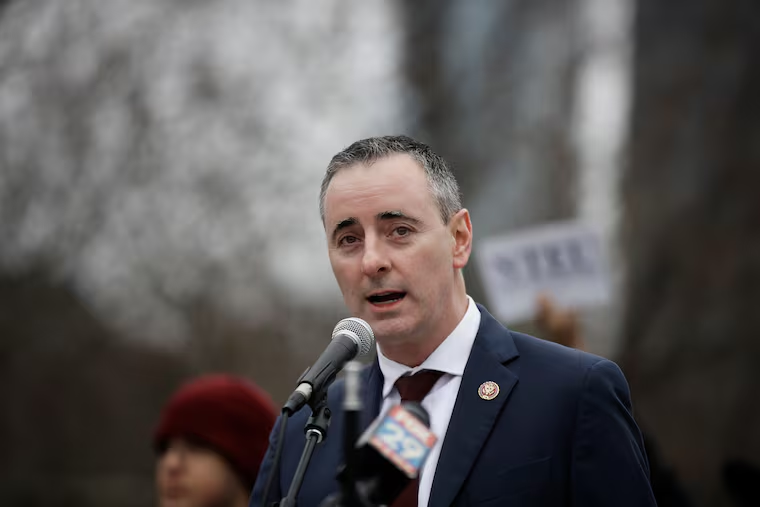Members of Congress will ‘put pressure on the EPA’ to address PFAS-contaminated water
A House task force wants the Environmental Protection Agency to designate per-and polyfuoroalkyl substances, or PFAS, as hazardous substances and regulate how much of the chemicals can be present in drinking water.

Pushing for a safe-drinking-water standard and hoping to hold polluters and the Environmental Protection Agency accountable, a group of members of Congress created a task force Wednesday to address nationwide contamination of water by chemicals used on military bases.
The bipartisan House members forming the task force have dealt with the problem in their individual districts, from Pennsylvania to Michigan. Republican Rep. Brian Fitzpatrick of Bucks County is a cochair, and Democratic Reps. Madeleine Dean of Montgomery County and Brendan Boyle of Philadelphia are members; the three have represented towns in Bucks and Montgomery Counties where tens of thousands have been affected by tainted drinking water from nearby former military bases.
The group wants the EPA to designate per- and polyfuoroalkyl substances, or PFAS, as hazardous substances and regulate how much of the chemicals can be present in drinking water. Citing contamination that has affected residents, lakes and rivers, and dairies and fishermen in their districts, the lawmakers stressed at a news conference Wednesday afternoon that they want the EPA to move swiftly.
“We’re all going to collectively put the pressure on the EPA to make a decision,” Fitzpatrick said in an interview.
Firefighting foams used by military bases, airports, and private companies nationwide contain PFAS, but the chemicals are also present in many modern-day products and have been linked to cancer, fertility problems, liver damage, high cholesterol, and other health problems.
The EPA set a health advisory level in 2016, recommending how much of the chemical is safe to drink, but it is only a guideline, and many states and towns have questioned the level or have set their own, stricter rules. If the EPA designated PFAS as a hazardous substance, it would create a maximum contaminant level (MCL), a standard that would apply nationwide. The lawmakers’ push for EPA action echoes years of demands from residents and officials for the agency to create a true regulatory standard for PFAS in drinking water.
On the 33rd day of the longest government shutdown in U.S. history, Dean noted, most EPA employees were furloughed and the agency cannot take any action. Gov. Tom Wolf said Wednesday that the shutdown had delayed a federal report on the water contamination.
The congressional task force also wants more studies on PFAS health effects from the Centers for Disease Control and Prevention and to examine funding for cleanup, from drinking water filters to groundwater remediation.
“This group up here is looking at what are individual cases in their own districts and realizing that we have a systemic problem. And we are not set up for it,” said Rep. Elissa Slotkin (D., Mich.). “We need to start thinking of environmental security the way we think about homeland security.… If you can’t give your child a glass of water without risk of them getting sick, if you can’t fish the rivers that your grandfathers fished in or eat the venison that forage around that river, that is a threat to your way of life.”
In Horsham, Warrington, and Warminster, where levels of the chemicals found in drinking water exceeded the Environmental Protection Agency’s health advisory, the military has helped address contamination, but more extensive cleanup is still in early stages. Residents have clamored for a faster and more thorough federal response.
Blood tests of residents in those three communities released last year found that people who drank the tainted water have levels of PFAS in their blood above the national average.
Residents in at least 22 other towns in Bucks and Montgomery Counties also have PFAS in their drinking water. In New Jersey, the military has tested private wells near Joint Base McGuire-Dix-Lakehurst and provided bottled water to residents with wells that tested over the EPA advisory level.
The military is testing more than 400 bases nationwide for similar contamination. The process will take years and cost millions.
EPA regulation would alleviate problems caused by the current lack of federal regulation, Fitzpatrick said; it would give residents recourse for civil lawsuits, allow criminal charges to be brought against polluters or chemical manufacturers, and help determine property values for contaminated sites in need of redevelopment.
Task force members are introducing an array of related bills; in addition to asking the EPA to create a nationwide standard for drinking water, the representatives will attempt to do it with legislation. Boyle, who led an effort last year that secured $100 million in funding for health studies and testing, is pushing legislation that would add an enforceable standard for the chemical to the Safe Drinking Water Act.
The lawmakers also said that some attorneys general were preparing legal action against the chemical manufacturers and that a committee hearing on PFAS would be held in Congress at some point.